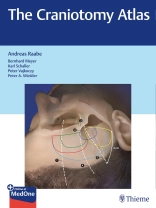<p><em>’… the neurosurgical primer that every resident will own and study’ – Robert Spetzler</em></p><p>Given that the great majority of brain surgeries are preceded by a craniotomy, mastering the procedure is essential for junior residents. Choosing the appropriate craniotomy and executing it safely is the difference between a straightforward case with good access to the target and a procedure where access to the target is needlessly traumatic and may even be impossible.</p><p>Professor Raabe’s <cite>The Craniotomy Atlas</cite> provides precise instructions for performing all common neurosurgical cranial exposures, including: convexity approaches, midline approaches, skull base approaches, transsphenoidal approaches and more. Instructions for each craniotomy include positioning, head fixation, aesthetic considerations, and protecting the dura mater.</p><p><strong>Special Features:</strong><ul><li>More than 600 high-quality operative photographs and brilliant illustrations support the step-by-step descriptions, with all the precision and attention to detail that neurosurgeons have come to expect from the editor Professor Raabe, and the associate editors Professors Meyer, Schaller, Vajkoczy, and Winkler.</li><li>Full coverage of complications and risk factors</li><li>Checklist with summaries of the critical steps</li></ul></p><p>All residents and trainees in neurosurgery will treasure this essential resource, which will help build confidence when performing these critical neurosurgical procedures.</p><p>This book includes complimentary access to a digital copy on <a href=’https://medone.thieme.com’>https://medone.thieme.com.</a></p>
Mục lục
<p><strong>1 Basics</strong><br>1.1 Craniotomies Overview<br>1.2 Difference between Approach and Craniotomy<br>1.3 Craniotomies We Have Omitted from This Book and Why<br>1.4 Positioning<br>1.5 Rigid Head Fixation<br>1.6 Esthetic Considerations in Neurosurgical Procedures<br>1.7 Protection of the Dura Mater<br>1.8 Sinus Laceration<br>1.9 Frontal Sinus Breach and Repair<br><strong>2 Landmarks</strong><br>2.1 Schematic Cortical Anatomy<br>2.2 Craniocerebral Topography<br>2.3 Identifying Cortical Landmarks and Fiber Tracts in MRI<br><strong>3 Convexity Craniotomies</strong><br>3.1 Convexity Craniotomy Planning<br>3.2 Planning of Craniotomies at the Skull Convexity without the Use of Navigation<br>3.3 Supratentorial Convexity Craniotomy<br><strong>4 Midline Craniotomies</strong><br>4.1 Sinus-Crossing Craniotomies—Basic Principles<br>4.2 Supratentorial Midline Craniotomy<br>4.3 Infratentorial Midline Craniotomy<br><strong>5 Skull Base Craniotomies</strong><br>5.1 Frontal Craniotomies<br>5.2 Frontotemporal Craniotomies<br>5.3 Temporal Craniotomies<br>5.4 Posterior Fossa<br><strong>6 Skull Base Extensions</strong><br>6.1 Orbitozygomatic Craniotomy<br>6.2 Orbitocraniotomy<br>6.3 Intradural Anterior Clinoidectomy<br>6.4 Far (Enough) Lateral Approach<br><strong>7 Transsphenoidal Approach</strong><br>7.1 Microsurgical Endonasal Approach<br>7.2 Endoscopic Approach<br><strong>8 Decompressive Hemicraniectomy</strong><br><strong>9 Approaches to the Orbita</strong><br>9.1 Frontolateral Approach to the Orbit<br>9.2 Lateral Orbitotomy</p>












